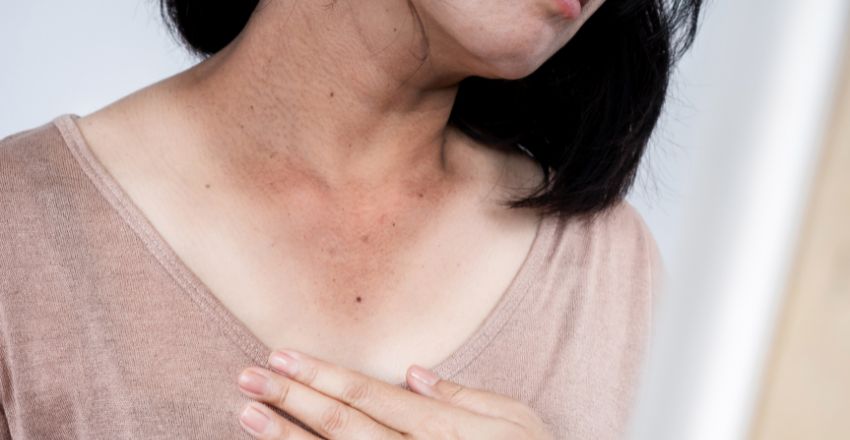Contact Info
-
Indirapuram: 080768 46266
-
Noida: 088105 60369
Anugraha Skin
If you’ve noticed dark, velvety patches of skin on your neck, armpits, or groin, you might be dealing with a skin condition called acanthosis nigricans (AN). While these patches might seem concerning, the good news is that acanthosis nigricans is treatable and is not contagious.

However, it could indicate a deeper issue like diabetes or other health conditions, so it's important to consult a dermatologist. We at Anugraha Skin & Laser Clinic offer effective acanthosis nigricans treatment in Indirapuram . We primarily manage the underlying condition and help clear up the skin's appearance.
Acanthosis nigricans is a skin disorder marked by dark patches that can appear anywhere on the body but are most common in areas where skin folds, like the neck, armpits, and groin. These marks may appear as stains or spots, but no amount of scrubbing will get rid of them. While the condition itself isn’t dangerous, it’s essential to understand its potential connection to health issues like diabetes, insulin resistance, and obesity. If you are suffering from neck pigmentation or dark patches, contact our expert for dark neck treatment in Indirapuram .
No, acanthosis nigricans is not contagious, meaning you can't spread it to others or catch it from someone else.
While acanthosis nigricans is not harmful, it may indicate an underlying health condition that requires attention. If you notice unusual patches or skin discoloration, it's a good idea to consult a healthcare provider or dermatologist who can run tests to determine the cause and recommend treatment options.
Anyone can develop acanthosis nigricans, even people who are otherwise healthy. However, certain factors may increase your risk, such as:
While acanthosis nigricans can be associated with diabetes or prediabetes, it doesn't automatically mean you have these conditions. It can, however, be a sign of elevated insulin levels, which are common in people with diabetes or prediabetes. If you notice signs of AN, it’s worth talking to your healthcare provider. Early intervention can help manage potential risks.
Though acanthosis nigricans is rare, it can be seen more frequently in people with obesity. Studies suggest that around 50% of adults with obesity, especially those weighing more than their ideal body weight, show signs of this skin condition.
There are several potential causes of acanthosis nigricans, including:
Symptoms typically include:
Symptoms usually develop slowly over months or even years. However, if they appear suddenly, it's important to consult with a dermatologist, as it could be a rare sign of cancer.
Treatment for AN depends on its cause. If the condition is linked to diabetes or another health issue, managing the underlying condition can improve the skin's appearance. Other options include:
Managing weight and controlling insulin levels through diet can help prevent or reduce the occurrence of AN. Additionally, treating underlying conditions like thyroid issues or diabetes can prevent the skin condition from worsening.
If you notice changes in your skin, whether small or large, it's important to see a healthcare provider or dermatologist. Even minor skin changes could indicate an underlying health problem, such as prediabetes or diabetes. Early intervention can help you get the proper treatment and care.
The cost of treating Acanthosis Nigricans varies depending on factors like the severity of the condition, underlying health issues (such as diabetes), and the type of treatment used (e.g., creams, laser therapy). More advanced treatments or multiple sessions may increase the overall cost. A consultation with a dermatologist will provide a more accurate estimate based on your needs.
Dr. Monica Bambroo is an expert dermatologist offering acanthosis nigricans treatment. With her advanced knowledge and commitment to the latest treatment techniques, she provides the best outcomes for her patients. Dr. Bambroo ensures that her patients feel at ease throughout treatment and works closely with each individual to achieve optimal results.
Visit our clinic today to discover and treat those dark patches by diagnosing their hidden causes.